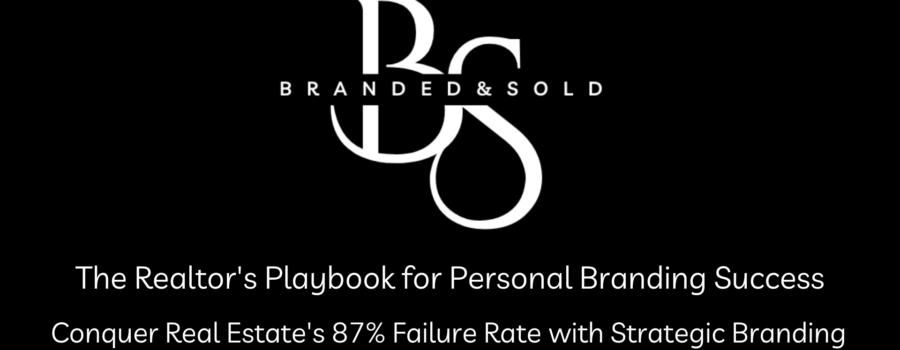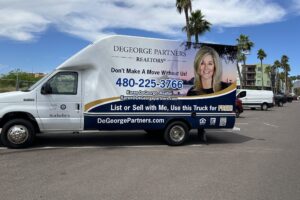The National Association of REALTORS® reported that 87% of real estate agents fail. This is not solely due to financial struggles but is a result of inadequate preparation and support from real estate companies and brokerages. This high failure rate signals that the industry must rethink its practices.
As a brand strategist with extensive experience working with high-end real estate brokerages and managing the brands of top-producing realtors in Arizona, we have spoken with and analyzed the challenges and frustrations of hundreds of realtors in the industry. The main issue is the need for more emphasis on personal branding, messaging, and practical instruction on brand identity for realtors. Many real estate companies and brokerages do not give their realtors the necessary tools and knowledge to succeed.
We have identified the key reasons behind this alarming trend and, more importantly, ways to turn the tide in your favor. Let’s explore the critical aspects agents overlook and discover actionable takeaways to strengthen your brand.
1. Lack of Personal Branding Understanding
Many real estate agents start their careers with a solid grasp of property knowledge but may need to gain the necessary personal branding skills to stand out in a crowded marketplace. This is where a thorough self-assessment can be helpful. By taking the time to identify your distinct strengths, values, and niche, you can create a personal brand that truly sets you apart from your competitors.
To begin, think about your unique selling proposition (USP). What sets you apart from other agents? What makes you different? Consider your core values and how they align with your business practices. This can help you create a brand that is authentic to who you are.
Next, think about your target audience. Who are your ideal clients? What are their needs and pain points? By understanding your audience, you can create messaging that speaks directly to them and helps you build a connection.
Once you clearly understand your USP and target audience, developing your brand is super important. This can include creating a logo, tagline, and other visual elements that convey your brand’s personality. It can also include developing a consistent voice, tone, and messaging across all your marketing channels.
Finally, it’s important to note that real estate companies have a role in helping agents develop their branding skills. Integrating personalized branding education into their training programs can allow agents to build the skills they need to create a solid personal brand and stand out in a crowded market.
2. Ineffective Messaging Strategies
Real estate is a business that relies heavily on building and maintaining relationships with clients. To be successful, it’s essential to communicate your value proposition effectively. However, many agents need help to articulate their services concisely. That’s why developing an elevator pitch that clearly defines your services, highlights your expertise, and addresses client pain points is essential. Your pitch should engage and educate your clients, building trust, which is crucial for a successful client-agent relationship.
3. Absence of Consistent Branding
Establishing a brand requires continuous effort and commitment rather than a one-time task. Often, agents fail to maintain a consistent brand image across all touch-points, which can harm the brand’s impact. Therefore, creating brand guidelines that cover visual elements, messaging tone, and communication style is crucial. Consistency in these aspects helps build familiarity, instill confidence, and reinforce your brand in clients’ minds.
4. Content Beyond Listings: Becoming the Authority
To establish yourself as an expert in real estate, it is essential to go beyond just showcasing properties. Instead, provide valuable content such as educational articles, market insights, and tips for buyers and sellers. Real estate companies should encourage their agents to be educators, not just promoters, to foster trust and establish them as go-to experts in the field.
5. Rethinking Content Marketing: Breaking Free from the Mold
Using generic, one-size-fits-all solutions is not always the best option for content marketing. These solutions often fail to capture the essence of individual brands. Therefore, it is crucial to tailor your content to reflect your brand’s unique personality and values. Doing so can help you stand out from your competitors and build a loyal following of customers who resonate with your brand’s message and values.
If you are a real estate company, consider personalized content strategies that empower your agents to stand out authentically. This means going beyond the traditional approaches to real estate marketing and finding creative ways to showcase your agents’ expertise, values, and personalities. For instance, you could feature interviews with your agents, share stories of their successes, and highlight their unique selling points. Doing so can create a more human connection with your audience and build trust with potential customers.
Customizing your content is essential to create a strong brand identity and stand out from your competitors in the crowded world of content marketing. By developing personalized content strategies that align with your brand values and empower your agents, you can create a more authentic and engaging experience for your audience.
6. LinkedIn Your Power Platform for Professional Branding
LinkedIn is a platform that is not just limited to job seekers but is also an excellent resource for real estate professionals. Currently, engagement on LinkedIn is at an all-time high, with the average session increasing by 22%. Therefore, it is crucial to have a well-planned content strategy that is both strategic and informed.
LinkedIn currently has 930 million members, with 16.2% of users logging in daily, which translates to 141 million people logging in every single day. There are over 36,000 active newsletters on LinkedIn. Marketers have reported seeing up to 2x higher conversion rates on LinkedIn, with the current conversion rate for a lead being 2.74%. Additionally, LinkedIn members viewed 22% more feed updates in 2023, year over year.
It is important to note that the 29 percent of American adults who use LinkedIn are an ideal demographic for real estate agents. No other social media platform boasts such a favorable demographic. Most LinkedIn users (77 percent) are aged 30 and above, nearly half earn more than $75,000 per year, and half are college graduates. Also, 90 percent of LinkedIn users make household decisions, which aligns neatly with NAR’s profile of the average home seller and buyer.
To succeed in the real estate industry, using LinkedIn strategically is crucial. One should share high-quality content, interact with their network, and establish themselves as a thought leader. Real estate companies should recognize LinkedIn as a vital tool in their agents’ toolkits and provide training on optimizing profiles and creating engaging content.
To achieve real estate success, focusing on strategic personal branding is essential. As a brand strategist, embrace these principles, challenge traditional content marketing methods, and redefine your narrative to create an authentic path that leads to lasting success in the real estate industry.




